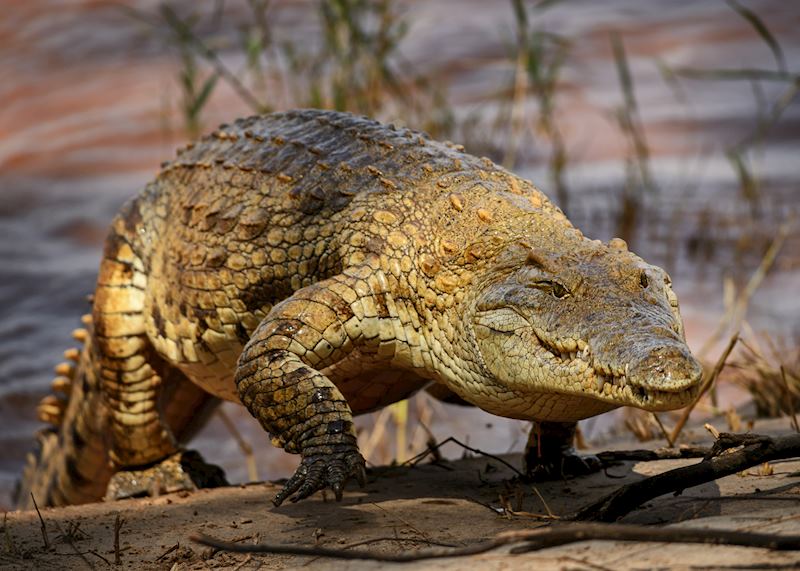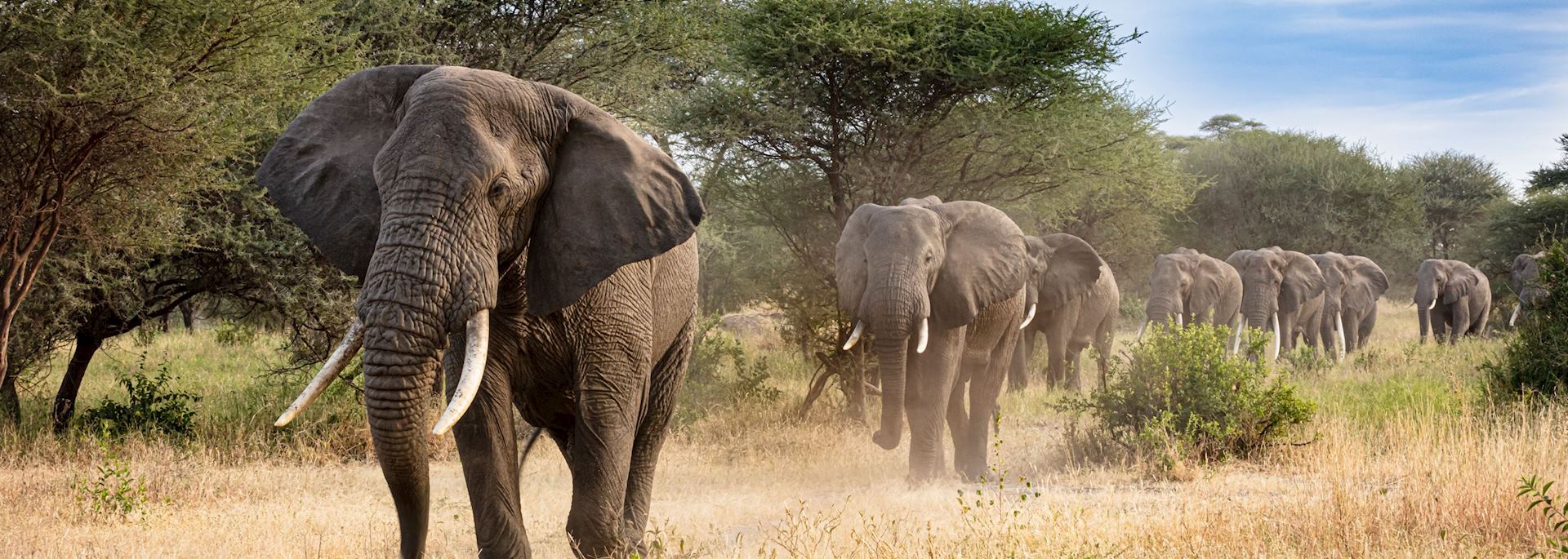Sweeping savannas, grassy wetlands, and wind-sculpted dunes play host to hundreds of creatures across Africa, from tiny reptiles to the largest mammals on the planet. Which ones capture the public’s attention the most? We’ve delved into UK Google search data to find out.
Below, we reveal the top ten African safari animals and why they’ve earned a spot on our list. We’ve also gathered expert insights from our Africa specialists to let you know where you can see each species in its natural habitat, unveiling the best safari experiences across the continent.
1. Lion
Despite their apex-predator status in the animal kingdom, lions have captured people’s hearts since childhood, with beloved films and whole documentaries dedicated to their hunting prowess. That’s why it’s no surprise to see them on our list of top ten African safari animals. The good news is that you can see lions across Africa with relative ease, though each destination offers a different experience.
If it’s your first safari and you’d like to see all of the Big Five (lions, leopards, elephants, buffalo, and rhinos), you can’t go amiss with a trip to South Africa’s Greater Kruger Region, which you can pair with a city break in Cape Town. Or, to witness the drama of the Great Migration, when herds of migrating wildebeest attract opportunistic prides, head to the Serengeti in northern Tanzania.
For a luxury lion-spotting experience, we recommend a trip to Botswana’s Okavango Delta. Alongside safari drives and boat rides, you can head out on foot with a guide who’ll point out the paw prints of resident cats as you walk, before you retreat to your luxury lodge.
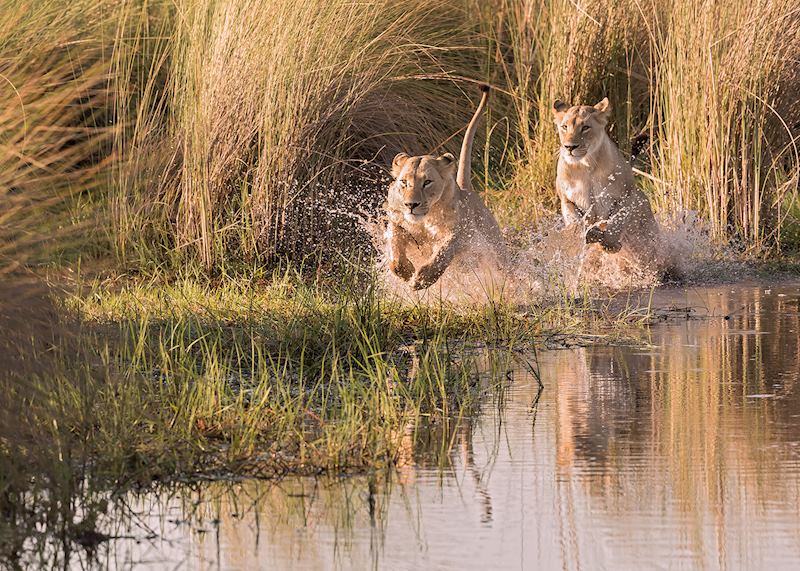
2. Gorilla
After chimpanzees and bonobos, gorillas are humans’ closest living relatives and share up to 98% of our DNA. It’s perhaps this odd familiarity that makes gorillas one of the top safari animals in Africa. Not only that, but you can only encounter mountain gorillas in the wild — they don’t survive in captivity.
Two of the only places you can get up close with these elusive (and often shy) creatures is in Rwanda’s Volcanoes National Park or Uganda’s Bwindi Impenetrable Forest. Encountering a troop often involves hours of hiking and bushwhacking through primeval forest with an expert guide, but this makes it all the more special when you finally set eyes on them.
To recuperate, you could add on time at the beaches of Zanzibar, doing as much or as little as you want on the sugar-soft sands. Alternatively, expand your safari beyond gorillas and take a primate tracking trip through Rwanda to spot chimpanzees and golden monkeys as well.
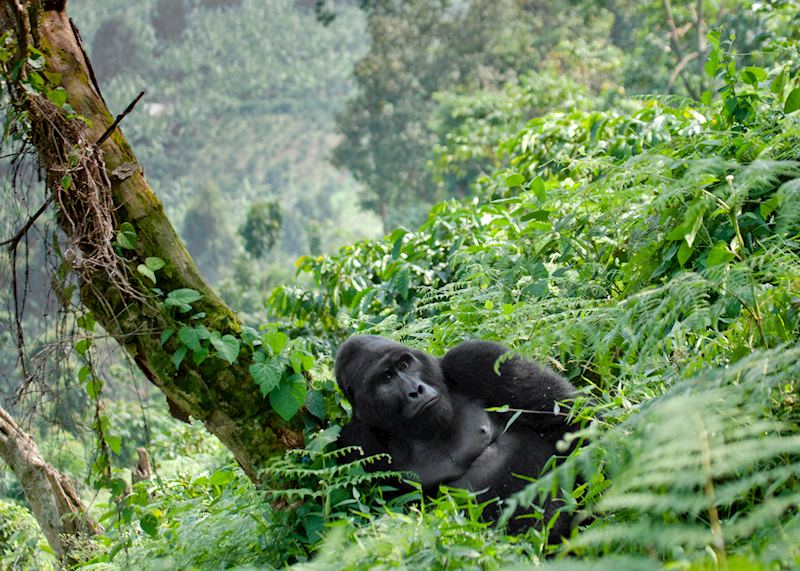
3. Elephant
Towering high above the undergrowth, elephants are the largest land animals currently on the planet, but they’re also gentle giants capable of displaying deep emotions. On safari, you can watch elephant herds frolic in waterholes, walk in convoy trunk-to-tail across the plains, and graze lazily under the sun, all the while learning about their intricate social structures and communication methods.
You’ll spot elephants across Southern and Eastern Africa. However, the highest concentration on the continent is in Botswana’s Chobe National Park, which we suggest pairing with a trip to the Okavango Delta. As you look out for herds among the region’s grassy floodplains, your guide might also point out leopards, cheetahs, and buffalo.
Or, for an entirely different elephant experience, you could opt for Namibia instead. Here, the local population has adapted to the desert climate and you can see herds wander against a stark backdrop of sun-scorched peaks.
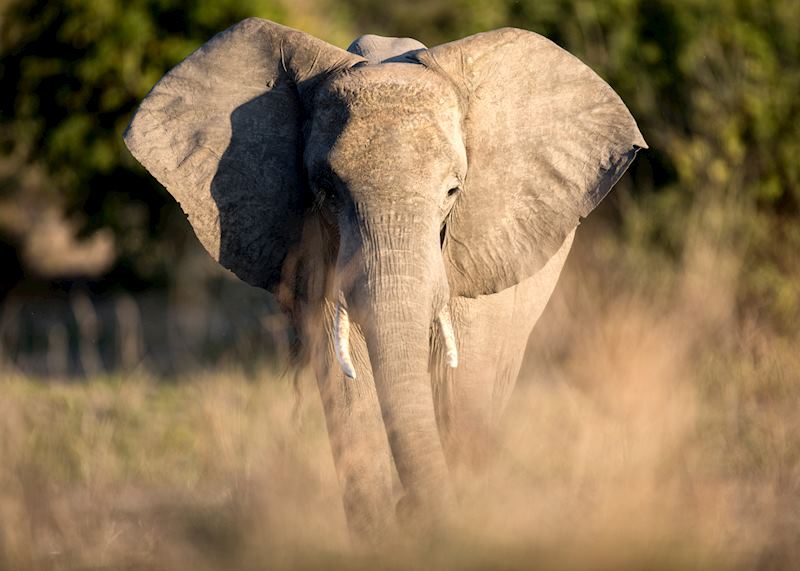
4. Buffalo
Leaving a trail of dust in their wake, buffalo move in huge herds, often fighting off lions as they go. During drier months, you’ll find them hanging around waterholes and floodplains, congregating in their hundreds for protection. When water is more abundant, they don’t linger as long, moving about constantly in search of food.
You can see buffalo herds in many parks and reserves across East and Southern Africa, but you’re most likely to encounter them wherever there’s a good water source (buffalo need to drink every day). Botswana is one of our top destinations for buffalo sightings, with herds moving between the Okavango Delta and Chobe National Park regularly. You can combine the two regions in a single trip, taking boat and mokoro (canoe) rides to spot the resident buffalo from a different perspective.
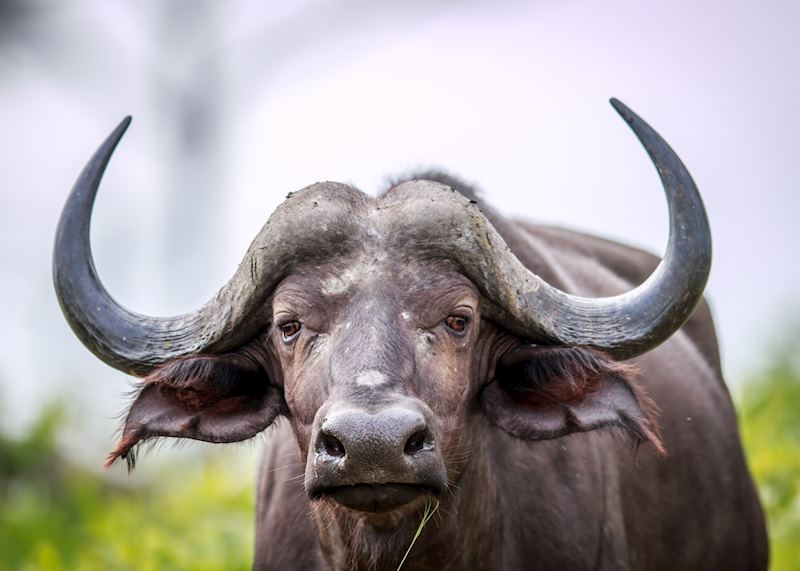
5. Flamingo
In whimsical shades of coral, pastel, and fuchsia, flamingos appear like something out of a fairytale. When flocked together, they paint the landscape in a pearly pink hue and, during breeding season, the males ‘dance’ in unison, heads bobbing and wings flapping as one.
Our specialists recommend taking a trip through northern Tanzania to spot flamingos, hippos, and tree-climbing lions in Lake Manyara before heading into the wilds of the Serengeti. If you’re an avid flamingo fan, you could also venture further north to Lake Natron, where around 75% of the world’s lesser flamingo population is born.
Alternatively, spot these fancy-feathered creatures at Lake Nakuru National Park in Kenya, just a couple of hours’ drive from Nairobi, which you can tie in with a wider safari and beach trip. Here, we recommend staying at a lava-stone cottage at Mbweha Camp, heading out on wildlife drives with your guide to watch the birds blanket the lake in a cloud of pink.
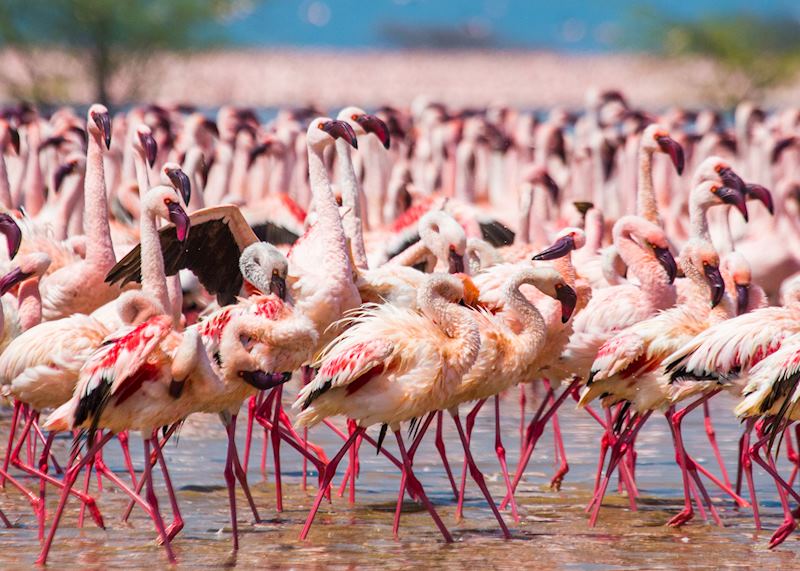
6. Giraffe
Coat patterns as unique as our fingerprints. Legs that appear to run in slow motion. Winding tongues that grapple with tree branches high above the savanna floor. Giraffes are curious creatures and unlike any other living animal on the planet. For this reason, it’s easy to see why they rank in third place on our list of top ten African safari animals.
On a trip to Nyerere National Park in Tanzania, you can watch as herds of over 50 giraffes congregate at the lakes, sliding into a splits-like position to crane their long necks down to water level. Or, for a rare opportunity to soar above these gangly creatures, take a hot-air balloon ride over the Masai Mara on a luxury safari in Kenya.
Another of our top destinations for giraffe-spotting is Botswana, at Thamo Telele lodge. Located just outside of Maun, the lodge boasts its own herd of 20 giraffes, which graze at the nearby waterhole. During your stay, its team of naturalists can teach you how to identify each individual by their distinct spot patterns. And, a portion of the money from your stay will go toward the Giraffe Conservation Foundation, which supports the species throughout Africa.
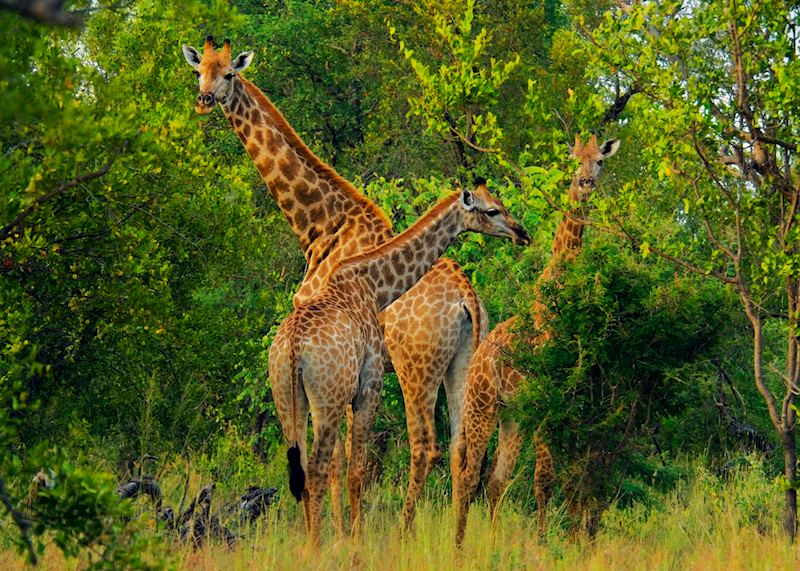
7. Scorpion
Dozens of scorpion species scuttle around Africa’s deserts, grasslands, savannas, and forests, but they’re not often the star of the show on a safari. Nevertheless, their reputation for being dangerous (not all actually are) is perhaps what reels in more adrenaline-oriented wildlife enthusiasts.
Scorpions tend to emerge at night and often steer clear of people, so you don’t have to worry too much about coming across one unwittingly. However, your guides and lodge staff will give you safety advice should you spot one (our specialists also recommend shaking out your shoes before putting them on, just to be safe).
That said, if you do want to proactively glimpse one of these pincered critters, a trip to Namibia’s dunes should be top of your list. Just south of Swakopmund, you can head out with a guide who’ll sift through the sand to unearth Namibia’s smaller creatures, including — if you’re lucky — scorpions. You might also spot dancing lizards and cartwheeling spiders.
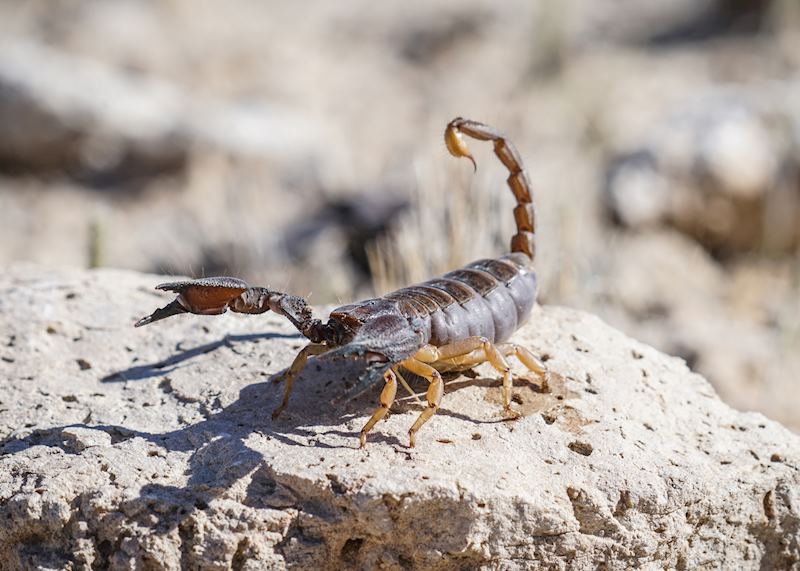
8. Cheetah
The fastest land animal in the world, the cheetah makes for a thrilling sight on safari. Even if you don’t catch them darting after prey, you can take the time to appreciate their solid black spots, rounded ears, and fuzzy stomachs as they lounge. Unlike leopards, they come out during the day, but they are typically harder to spot.
Though cheetahs are present in many of Africa’s wildlife reserves, including the Serengeti, Masai Mara, and Kruger National Park, our specialists particularly recommend a visit to Etosha National Park on a wildlife-focused trip to Namibia. It has large swathes of grassy plains, ideal for spotting cheetahs (and an array of other big cats), and is far less visited than Africa’s popular parks, meaning you won’t come across many other vehicles on your drives.
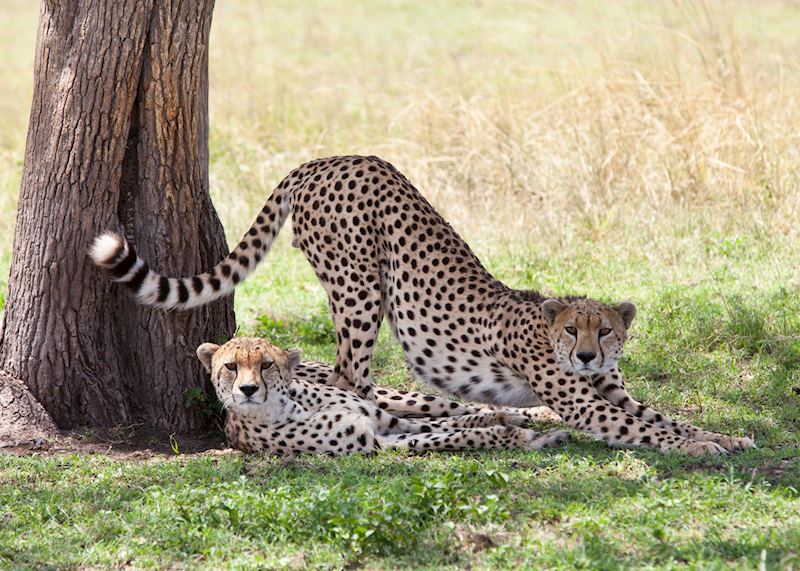
9. Chameleon
With striking color-shifting abilities, it’s no wonder chameleons make it onto the list. Contrary to popular belief, they don’t actually change color to blend with their surroundings, but instead to convey mood, communicate with mates, or to adapt to the temperature. Despite that, chameleons still tend to be hard to spot, so exploring with an eagle-eyed guide is a must.
Namibia’s dunes are the ideal place to spot chameleons — specifically, the Namaqua chameleon. These speedy little creatures change color to thermoregulate in the ever-changing desert climate, turning black in the morning to absorb the heat and a lighter shade in the daytime to cool off.
However, if you want to admire a more diverse array of chameleons, head to Madagascar. The island provides shelter for around half of the world’s species. On a rainforest and beach trip in the north, you might find the tiny Amber Mountain leaf chameleon, just the size of your fingernail.
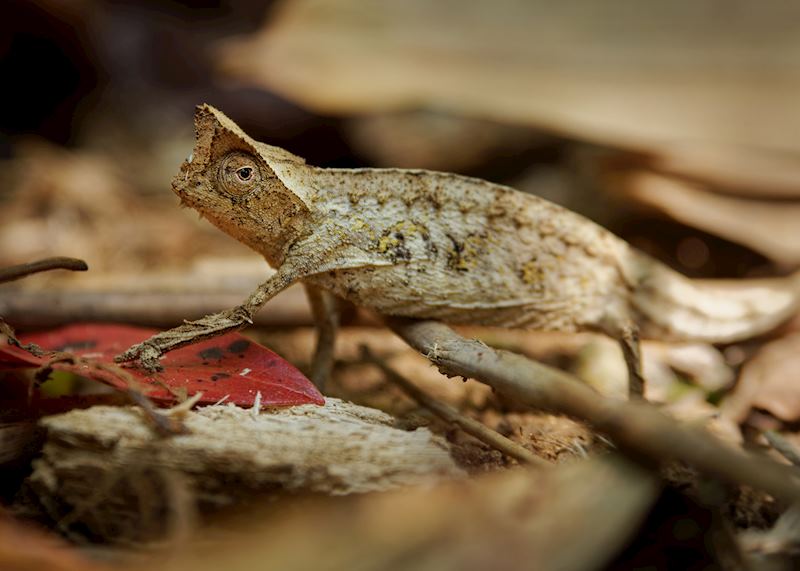
10. Crocodile
With their prehistoric appearance and powerful jaws, crocodiles are always high on people’s safari wish lists and feature in sixth place in our own list of top ten African safari animals. You can watch them basking lazily in the sun, gliding ominously through the water, or grappling with prey as they reveal an impressive collection of serrated teeth.
Perhaps the most exhilarating way to see crocodiles on safari is from the banks of the Mara River during the Great Migration. Here, they lurk and leap out of the water hoping to catch wildebeest and zebras as they dash to the other side. You can witness the drama on a trip to Tanzania or Kenya between July and October.
